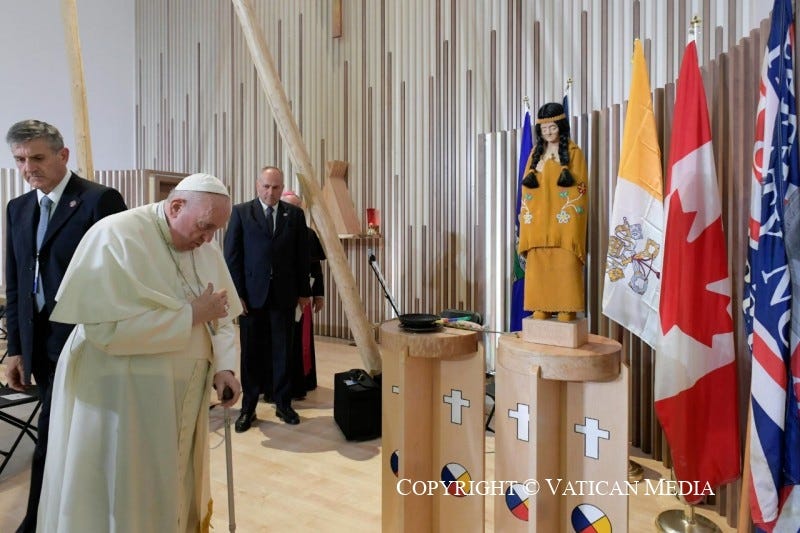One cannot proclaim God in a way contrary to God himself
Spiritual Abuse and Evangelization
Update! The September Spiritual Abuse Workshop is almost full! Here’s the link if you’re interested in signing up (and I’ll share more information at the end of this post):
Why is addressing spiritual abuse essential for the work of evangelization?
Integrity and credibility.
Pope Leo recently said in a tweet, “Together, we will rebuild the credibility of a wounded Church."
To say we need to rebuild is to say that where we are at right now is broken. And spiritual abuse is a significant reason for why our credibility is in shambles.
In Dignitatis Humanae, the Council taught that “In spreading religious faith and in introducing religious practices everyone ought at all times to refrain from any manner of action which might seem to carry a hint of coercion." And engaging in behavior that even hints at coercion is "an abuse of one's right and a violation of the right of others” (DH 4).
Pope Francis echoed this during his Apostolic Journey to Canada in 2022:
“Indeed, it may seem easier to force God on people, rather than letting them draw near to God. This is contradictory and never works, because that is not how the Lord operates. He does not force us, he does not suppress or overwhelm; instead, he loves, he liberates, he leaves us free…One cannot proclaim God in a way contrary to God himself. And yet, how many times has this happened in history! While God presents himself simply and quietly, we always have the temptation to impose him, and to impose ourselves in his name.”
The horrors that occurred in the indigenous residential schools that are the context for Francis's comments are only one example of ways Catholics have historically used coercion in the name of evangelization and mission.
But spiritual coercion is not just an historical problem, it's endemic within Christianity today. In one study in the UK, 75% of adult Christians reported experiencing harm in their religious communities due to manipulation, coercion or abuse of power.
75%.
And these are individuals who *still identify as Christian* after experiencing coercion.
In Catholicism, spiritual abuse can manifest in many ways. It can be as public as a priest threatening his congregation with hell/mortal sin if they vote for a particular political candidate or party. It's as private as a spiritual director telling their directee that God wants her to be a religious sister and that not pursuing that vocation is going against God’s will. It can look as overt as a narcissistic pastor bullying his staff or as subtle as a catechist telling someone in RCIA that they committed a mortal sin when they got divorced years before.
Spiritual abuse can cause long-term trauma symptoms like depression, anxiety, dissociation, intrusive thoughts and hyper-vigilance. It can severely damage a person's relationship with God and the Church. And the religious rituals and places that were once places of comfort and security may now cause panic attacks. Spiritual abuse can severely impact the quality of a person’s psychological, social and spiritual life.
In my work as a lay minister and professional counselor, I've seen the impact of spiritual abuse firsthand. I've worked with Catholics who have stopped going to Mass due to triggers leading to panic attacks; who now suffer from PTSD symptoms that impact their marriages and relationships; who no longer trust God because they have difficulty discerning God’s voice from the voice of their abuser; or who have lost their job and faith community due to narcissistic abuse from their pastor.
If we, in our ministry and evangelical work, are—to echo Pope Francis—proclaiming God in a way contrary to God himself, won't our efforts not only be in vain, but backfire? Won't we cause real harm to the dignity of others, and do so while invoking God’s name?
If you want to know more about spiritual abuse, join me next month for an online workshop focused on recognizing, preventing, and responding to spiritual abuse in the Catholic Church.
This workshop is for:
Individuals trying to better understand their experiences of spiritual abuse in the Church
Clergy and lay leaders interested in safeguarding their communities from spiritual abuse and abuse of conscience
Therapists or spiritual directors working with clients who have been spiritually abused
This workshop will help you:
Recognize and prevent spiritual abuse and abuse of conscience in the Church
Know the symptoms of spiritual abuse, religious trauma, and moral injury
Better understand and respond to abusive systems in the Church
Details:
This is five-part live workshop that will be held virtually. I’m running two workshops with day or evening sessions to accommodate different time zones and work schedules.
Groups will have between 5 and 12 participants and space will be filled on a first come, first serve basis.
Group 1 - Tuesdays, 8:00-10:00am (EST) | 9/2, 9/9, 9/23, 9/30, 10/7
Group 2 - Thursdays, 7:00-9:00pm (EST) | 9/4, 9/11, 9/25, 10/2, 10/9
Price:
It’s important to me that this workshop is available to anyone who can benefit from it, but it’s also an essential part of my family’s income. Based on my training and the time commitment, this workshop is valued at $400, but I don’t want financial cost to prevent you from registering.
While the full value of the five-part series is $400, you decide what you can pay. Whether it's $10 or more than $400, your contribution is appreciated. Also, even if you can't attend, but you are grateful resources like this exist, you can financially support the workshop. Any amount helps.
How to Pay:
1. Pay $400 with a credit card here: https://buy.stripe.com/fZu8wOaEy48ogpU8XZdIA01
2. Send a custom amount via PayPal (paul@faheycounseling.com) or Venmo (@catholicthirdspace)
With this flexible pricing I'm trying to ensure inclusivity while also supporting my family. I hope it can be an opportunity for solidarity within this community.
I’m looking forward to having you in the workshop!


